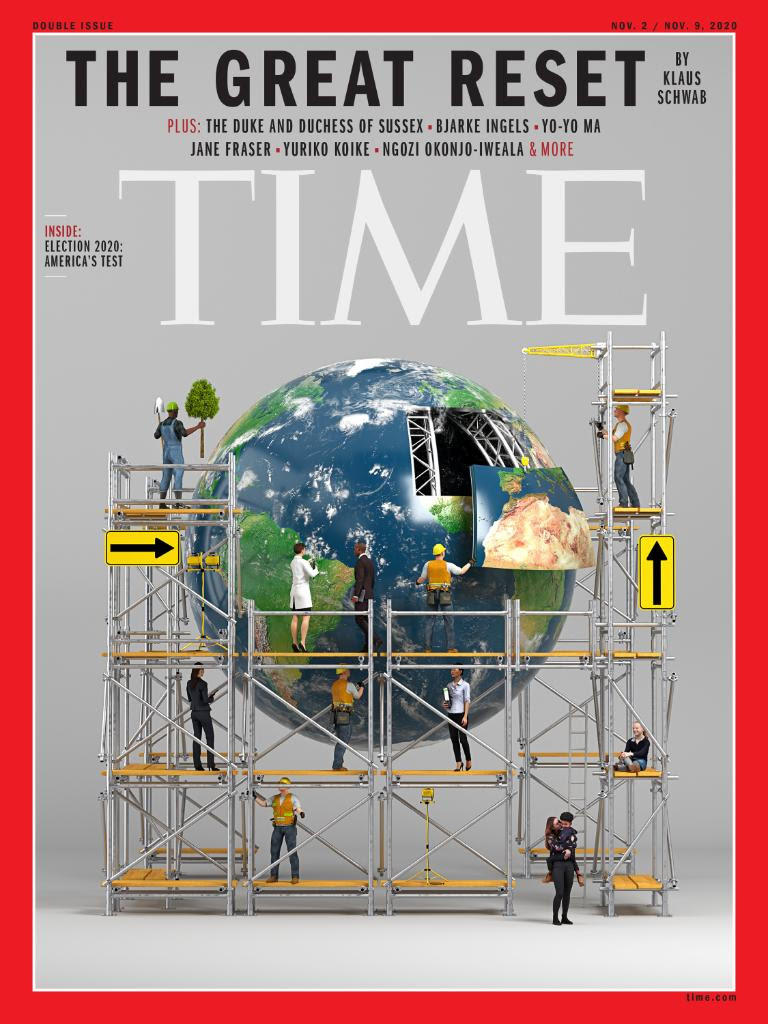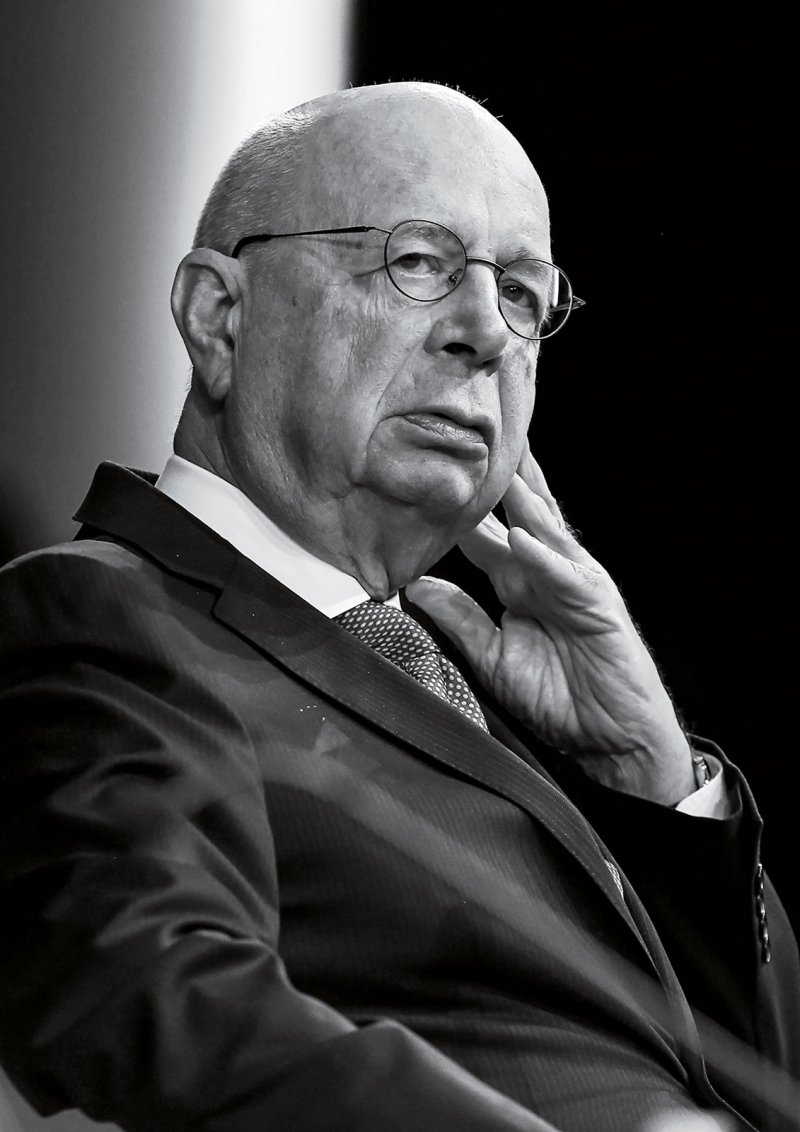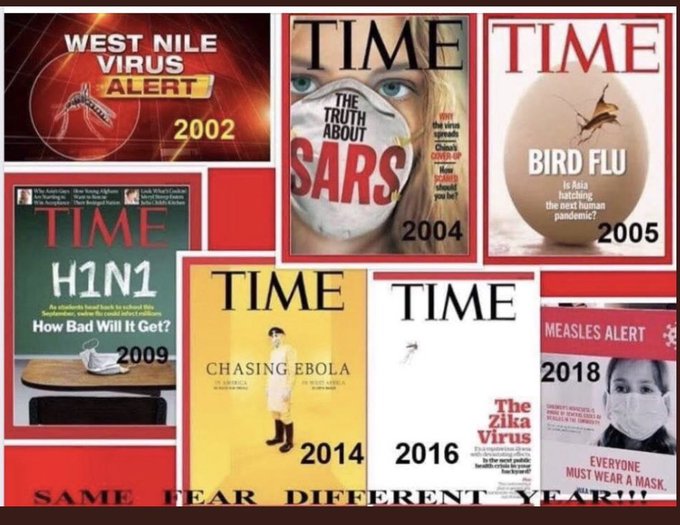Klaus Schwab’s Reset: Communism Replaces Free Enterprise
Henry Makow

TIME Magazine Backs Anti-Capitalist Reset
Time Cover Symbolism
11 people on the Cover. (11 adults plus 1 child)
The 11 is a Frequent NWO Number.
Installing the Final Piece of the Globe. The Final Piece of the NWO Reset.
The top Person is holding a Tree, the Green World Oder.
At the bottom is a Woman holding a Child. Families at the Bottom & Green Agenda at the Top.
What do the 2 Arrows mean? Pointing East & North.
“Rather than chasing short-term profits or narrow self-interest, companies could pursue the well-being of all people and the entire planet.”
The reason so many CEO’s have quit, why businesses alienate half their customers with political correctness, is that free enterprise and the profit motive are being phased out.
In the future companies will be valued according to their adherence to Communist shibboleths like climate change, minority rights, and “gender equity.”
Reader: “Satan can’t Create, only Reset & Destroy.
God created the Earth & created Man in his IMAGE.
Satan is Resetting the World in his IMAGE.
The Great RESET
A Better Economy is Possible but we Need to Reimagine Capitalism to Do It
by Klaus Schwab
(Excerpt by henrymakow.com)
…The same economic system that created so much prosperity in the golden age of American capitalism in the 1950s and 1960s is now creating inequality and climate change.
And the same political system that enabled our global progress and democracy after World War II now contributes to societal discord and discontent. Each was well-intended but had unintended negative consequences.
Yet there are reasons to believe that a better economic system is possible–and that it could be just around the corner. As the initial shock of the COVID crisis receded, we saw a glimpse of what is possible, when stakeholders act for the public good and the well-being of all, instead of just a few.
Mere months after the pandemic began, work was started on more than 200 potential SARS-CoV-2 vaccines. Many of them resulted from a multinational collaboration involving both the public and private sectors, like AstraZeneca’s collaboration with Oxford University in the U.K. Companies like Unilever approached the World Economic Forum‘s COVID Action Platform with offers to supply hygiene products, ventilators or simply logistical help. There was also strong cooperation between governments and business, to secure the funds needed for vaccine development and distribution.
Looking forward, such virtuous instincts can become a feature of our economic systems rather than a rare exception. Rather than chasing short-term profits or narrow self-interest, companies could pursue the well-being of all people and the entire planet. This does not require a 180-degree turn: corporations don’t have to stop pursuing profits for their shareholders. They only need to shift to a longer-term perspective on their organization and its mission, looking beyond the next quarter or fiscal year to the next decade and generation. Some are already doing so.
Maersk, a Danish shipping giant, for example, divested its oil and gas divisions, and is focusing on providing sustainable shipping solutions. Reacting to increasing pressure from climate activists and younger generations, BlackRock asked the CEOs of companies it invested in to more explicitly pursue environmental, social and governance goals. These decisions may hurt short-term profits for itself as shareholder, but it maximizes long-term returns in a world where people increasingly revolt against a system they perceive as unfair.
Building such a virtuous economic system is not a utopian ideal. Most people, including business leaders, investors and community leaders, have a similar attitude about their role in the world and the lives of others. Most people want to do good, and believe that doing so will ultimately benefit everyone, including a company’s shareholders. But what’s been missing in recent decades is a clear compass to guide those in leading positions in our society and economy.

(Klaus Schwab, human benefactor, and visionary)
For the past 30 to 50 years, the neoliberalist ideology has increasingly prevailed in large parts of the world. This approach centers on the notion that the market knows best, that the “business of business is business,” and that government should refrain from setting clear rules for the functioning of markets. Those dogmatic beliefs have proved wrong. But fortunately, we are not destined to follow them.
In September, my belief that a more virtuous capitalist system is possible was reaffirmed by an initiative of the forum’s International Business Council led by Brian Moynihan of Bank of America. They released the Stakeholder Capitalism Metrics: nonfinancial metrics and disclosures that will be added (on a voluntary basis) to companies’ annual reporting in the next two to three years, making it possible to measure their progress over time.
Doing so requires answering questions such as: What is the gender pay gap in company X? How many people of diverse backgrounds were hired and promoted? What progress has the company made toward reducing its greenhouse-gas emissions? How much did the company pay in taxes globally and per jurisdiction? And what did the company do to hire and train employees?
The initial idea that companies should try and optimize for more than just short-term profits came around 2016 from a handful of business leaders who wanted the private sector to play a role in achieving the U.N. Sustainable Development Goals (SDGs). Individuals such as Moynihan, Frans van Houten of Philips and Indra Nooyi, then at PepsiCo, enlisted many of their peers in this commitment.
In the following years, pressure from social- and climate-justice movements such as Fridays for Future (inspired by Greta Thunberg), #MeToo and Black Lives Matter added to the sense of urgency. Business needed to do more than make a well-intentioned but vague pledge. By the summer of 2019, Moynihan and others put forth the idea of creating a tool to measure themselves. By the fall, the work was under way, and the Big Four consulting firms–Deloitte, EY, KPMG and PwC–signed on to define the metrics.
By January 2020, a first consultation draft of the metrics was ready, and enthusiastically received.

Then the COVID-19 disaster struck. Would the project survive this global crisis? And, more broadly, would the whole idea of stakeholder capitalism die in the COVID crisis? The concept had been embraced by the U.S. Business Roundtable–a major Washington-based lobbying group of U.S. firms– just months earlier. Now, it was feared, that nascent commitment to stakeholder capitalism could make way for a more realistic approach in companies: save what you can, even if it means laying off employees or cutting off suppliers.
But if anything, the enthusiasm of the companies working on the project increased. “There was a sense that this was really important, especially in the crisis,” said Maha Eltobgy, who headed the initiative for the World Economic Forum. In the fall of 2020, the metrics were finalized and publicly released.
Of course, we remain far from our goal of achieving a better global economic system for all. The Stakeholder Capitalism Metrics are just one of many initiatives that are needed to get to such an outcome–and time is quickly running out. But in a world where pessimism is increasingly the order of the day, and narrow and short-term self-interest is still alluring, initiatives like these demonstrate that a more inclusive and sustainable model is possible. It is up to us to replicate and follow such an approach. When that happens, those who follow the path of stakeholder capitalism will soon find that it leads to a more inclusive and sustainable economy for all.
This essay was adapted from his book Stakeholder Capitalism, to be published in the U.S. by Wiley in January 2021
Related posts:
Views: 0
 RSS Feed
RSS Feed

















 November 1st, 2020
November 1st, 2020  Awake Goy
Awake Goy 




 Posted in
Posted in  Tags:
Tags: 
















